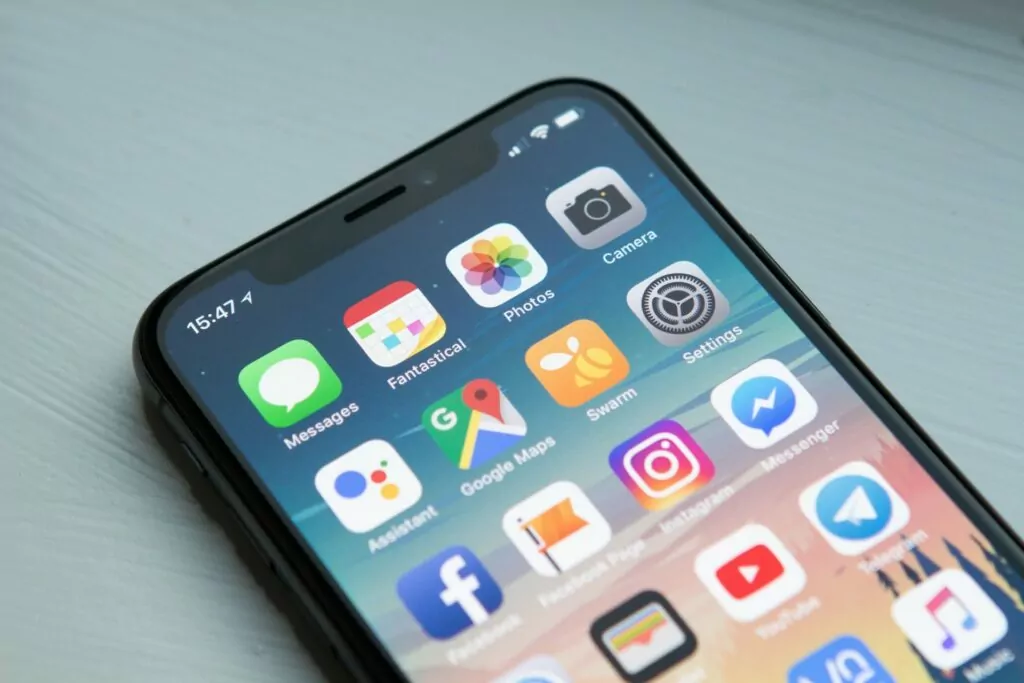One of the most frequently asked questions we receive from startups is whether they should build their initial platform on web or mobile first. This is a pivotal decision that can have huge ramifications on user adoption‚ revenue and the product’s overall success.
Over the past 10 years‚ we have worked with a range of successful startups‚ from parking giants YourParkingSpace to emerging stars Odhealth‚ helping them to refine their product strategy and build initial platforms.
This work has given us an invaluable first-hand experience of the questions startups need to address when deciding to go web or mobile-first.
But first‚ a few definitions.
What is the difference between mobile applications‚ web applications and websites?
Mobile apps or native/hybrid apps are software applications which can be downloaded directly onto the user’s device using an application distribution platform such as Google Play or Apple’s App Store.
While mobile apps are increasingly dominant in the consumer space‚ there is also a wide range of industrial uses such as factory automation‚ GPS and location-based services‚ order-tracking platforms‚ and ticketing services.
Web applications‚ by contrast‚ are software applications that are accessible via all modern web browsers such as Chrome or Safari. Browser-based web apps can be used to offer a range of services such as project management software‚ photo editing‚ CRMs and a whole suite of business applications.
The distinction between web apps and websites is relatively fluid‚ however‚ web apps generally have similar functionality to desktop software applications and provide greater interactivity. For example‚ a Software as a Service platform running within a browser would be considered a web application.
Websites are generally more focused on displaying content as opposed to offering functionality.
What are Progressive Web Applications?
Progressive Web Apps (also known as PWAs) use the latest web technologies to combine the best of web and mobile apps.
The main difference between a native mobile application and a PWA is that a PWA does not need to be downloaded‚ as it is accessible from the browser. PWAs can offer a full-screen experience and can be added to a mobile device’s home screen with an icon.
PWAs are also able to cache data and offer some offline functionality‚ but this does not currently extend to full offline functionality as found in native apps.
What are Hybrid Mobile Apps?
Hybrid Mobile Apps‚ also known as cross-platform apps are mobile applications built using a cross-platform framework such as Flutter or React Native.
One of the main advantages of using a cross-platform framework is that they allow you to share code between iOS and Android projects‚ meaning that you can quickly build an app for both platforms.
Further Information: read more about why we use Flutter as our preferred cross-platform framework and a detailed description of the differences between iOS‚ Android and Hybrid apps.
The key things you should consider when deciding to go web or mobile-first
How do users expect to discover and access the specific services your platform is providing?
According to App Annie’s latest report‚ mobile is en-masse our go-to device‚ with users spending on average 3h and 40 minutes per day on their device. It is estimated that 90% of this time is spent within mobile apps‚ with the remaining 10% spent within browsers.
Many activities that were previously confined to desktop browsers‚ or even paper‚ are moving over to mobile devices as users become more comfortable with accessing a range of services.
Financial services are a particular growth sector for mobile apps. Globally consumers accessed finance apps over 1 trillion times in 2019‚ up 100% from 2017. It would make sense that any FinTech startup would seek to go mobile-first when developing their platform.
Ecommerce‚ on the other hand‚ is slightly more complex. If you’re setting up an online store and want to reach consumers on mobile‚ it may make more sense to develop for the web first‚ as users will expect to purchase and buy from any device. Mobile apps also miss out on SEO and organic web traffic‚ as they are not part of the traditional web ecosystem.
“For us‚ the decision to develop our mobile apps was a very practical one; we always ask ourselves what will deliver the best experience for our customers. What we do is deliver high-quality video consultations between customers and personal trainers. The tech stack that developing in native app languages gave us was the ideal solution and the overall consumer experience far stronger.”
Tom Sheppey‚ Co-Founder‚ Odhealth
Where will users want to access your product?
Understanding your users’ preferences and behaviours is key to understanding whether to build web or mobile-first. For example‚ if you expect users to want to access your services on the go‚ a mobile app will certainly provide them with a better experience. Mobile apps support offline functionality‚ push notifications while the device isn’t in use and provide location services. It’s also worth considering that most people have their mobile device on them at all times.
However‚ there are still some activities which predominantly take place on desktops and in static locations such as offices or homes. If you are looking to build a SaaS platform which has a business use case‚ your users will most likely want to access this via their browser on a desktop. This is where a web application comes into its own‚ as it can be optimised for mobile use‚ but will provide the best user experience when it comes to complex functionality and use on multiple devices.
“When creating our leadership development platform‚ we decided to build an app first because we know that people want bite-size‚ accessible content on the go. We also wanted to take advantage of push notifications to alert users to new content wherever they are”
Lauren Currie OBE‚ CEO & Co-Founder‚ Stride
We chose to build a web app first because our business is focused on admin management‚ which is something typically performed when one is sitting down at a computer and takes the time to do admin. We also made it responsive so anyone could access it via mobile too. The more that we see mobile use increase it will make a better case to create the mobile app version.
Jessica Mendoza‚ Founder‚ Monadd
Do you need to personalise the user experience?
Personalisation is best done on native or hybrid mobile apps‚ as they allow you to present unique experiences and functionality customised to specific users‚ as opposed to a broad‚ one size fit alls experience for everyone.
Spotify‚ for example‚ takes a highly personalised approach by providing users with unique content (Discover Weekly) and seasonal recommendations. This is all calculated algorithmically based on both the individual users’ behaviour and aggregated data which allows Spotify to analyse and predict trends across its entire user base.
Personalisation can also make the most of hardware features such as location services. In 2015 Spotify famously partnered with the Nike+ Running app to generate playlists based on the users’ running pace.
Will users be motivated to download a mobile app?
While app downloads are growing in popularity globally‚ there is some drop off when targeting users in mature markets such as the UK‚ USA and Japan. Getting people to install a mobile app can be a hurdle‚ as it adds another friction point to the user journey.
There is a strong case for building mobile apps first when there is a clear benefit for downloading an app. For example‚ ticketing apps are extremely popular because they collate vital information and functionality all in one place‚ providing a seamless user experience that is optimised for speed. This solves a key pain point for users who may be in a rush or desire the convenience of having all their travel information in one place.
However‚ if this immediate need is less pronounced‚ it may be worth considering a web application which provides instant access. This is especially important if you’re providing information or content‚ as users are less likely to wait to download an app if their need is immediate.
“We decided to build a web app first for a few reasons; it was quicker‚ cheaper & easier with the team we had at the time. But more importantly than that‚ we found a mobile-responsive web app was more accessible for our early users than a native mobile app. They didn’t need to download anything and would immediately begin their user journey as soon as they clicked the link they had discovered on the social platform we were using to engage with early users. The seamless jump from discovery to usage was critical during the earliest versions when no one knew anything about us.”
Caroline Huges‚ Co-Founder & CEO‚ Lifetise
Are you relying on notifications or offline functionality?
Sending push notifications is possible on both web and mobile apps‚ however mobile definitely has the upper hand when it comes to altering users to new updates‚ content or features.
Web push notifications are delivered through the browser and require the user to be using the device to receive the notifications. App push notifications can be delivered to users even while the phone is in lock mode and also support rich media‚ meaning that the notification can include images‚ gifs and even video.
If your application relies on notifications to alert users to key pieces of information‚ it may be worth exploring a mobile app first as the enhanced notification features will deliver a better user experience.
Mobile apps can also work completely offline. As the app is already on the device‚ this means that the user doesn’t need to wait for a network request to be made before they can start using an app.
This is opposite to a web application‚ as pages need to load before you can interact with them. This delay can be amplified by a weak or no signal‚ sometimes even making it impossible to use in any form. While a mobile app might still need to connect to a web service to pull or push data‚ it can still have some functionality while it is doing so‚ even if that takes a longer time than the user would like.
How often will you need to update the application?
Mobile apps generally have a slightly longer update process than web applications‚ which can be instantly updated through code changes and deploys. This is because mobile updates have to go through third-party app stores which review submissions against quality guidelines. This ensures the best possible user experience but comes at the expense of rapid changes and iterations.
If you need to move quickly and release new features on a regular basis‚ a web application may be the better choice.
‘Building a PWA provides the best of both worlds. Creating a mobile app would require us to maintain code and go through the approval process for both Android and iOS. Working this way allows us to adapt quickly to our user feedback which is extremely important whilst building Tenancy Stream‚ this allows us to get to market quicker with new features’
James Thorn‚ Founder‚ Tenancy Stream
Conclusion: Mobile App or Web App – Which Should You Build?
The decision to build mobile or web first undoubtedly rests on your understanding of your users’ preferences and behaviour. As our Sales Director Rob explains:
“The decision can often based based around two simple points:
- How often do we expect the user to engage with the platform?
- How often do we expect the user to keep the app on their phone?
Baring certain platforms (i.e. Facebook) it is unlikely a platform will achieve both high engagement and download longevity.
In my experience‚ the platforms that are most suited to being a mobile application are those that solve highly specific pain points that users experience repeatedly on the go‚ e.g. the need for immediate transport or food delivery.
Business or multiple-use applications on the other hand‚ such as SaaS platforms‚ are much more suited to web-first builds as they are often used for long periods of time in stationary environments.”
Need help with your web or app first decision?
Each startup is different and there will be considerations for every build that are unique to the idea‚ functionality and audience.
Our team has worked alongside numerous founders helping to define‚ refine and build their platforms from MVP to extensive ecosystems. Not only do we provide developers who can assist on the technical considerations‚ we also work consultatively to help discover audience trends‚ competitor positioning and market opportunities.
If you need help deciding which way to go‚ feel free to contact our expert team for a no-obligation chat about your application.





